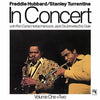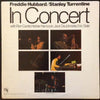





Freddie Hubbard and Stanley Turrentine - In Concert (2LP)
Freddie Hubbard - trumpet [click here to see more vinyl featuring Freddie Hubbard]
Stanley Turrentine - tenor saxophone [click here to see more vinyl featuring Stanley Turrentine]
Ron Carter - double bass [click here to see more vinyl featuring Ron Carter]
Herbie Hancock - electric piano [click here to see more vinyl featuring Herbie Hancock]
Jack DeJohnette - drums [click here to see more vinyl featuring Jack DeJohnette]
Eric Gale - guitar
Written by Freddie Hubbard
2 LPs, gatefold sleeve
Original analog Master tape : YES
Heavy Press : 180g
Record color : black
Speed : 33 RPM
Size : 12'’
Stereo
Live
Record Press : Pallas
Label : Speakers Corner
Original Label : CTI
Recording: March 1973 live at Chicago Opera House and Ford Auditorium, Detroit, by Charles Buchanan. Remixed by Rudy Van Gelder
Production: Creed Taylor
Originally released in 1974
Tracks :
Side A :
- Povo (Detroit)
Side B :
- Gibraltar (Chicago)
Side C :
- Hornets (Chicago)
- Interlude (Chicago)
- Hornets (Detroit)
Side D :
- Gibraltar (Detroit)
Reviews :
« This LP pairs trumpeter Freddie Hubbard and tenor-saxophonist Stanley Turrentine, two very individual players who always brought out the best in each other. They stretch out on long versions of "Povo" and "Gibraltar" that clock in around 19 minutes apiece. The backup rhythm section (guitarist Eric Gale, keyboardist Herbie Hancock, bassist Ron Carter, and drummer Jack DeJohnette) is a major asset and inspires the two horns to play reasonably creative solos. » AllMusic Review by Scott Yanow
Freddie Hubbard emerged from the hard bop, bop and post bop jazz idioms to become a very influential trumpeter. in the 60’s he played on albums like Maiden Voyage (Herbie Hancock), The Blues And The Abstract Truth (Oliver Nelson), Out to Lunch (Eric Dolphy) and Speak No Evil (Wayne Shorter). He was equally adept at both tonal and atonal music interpretation. Though not an advocate of free jazz, he appeared on two significant albums, Ornette Coleman’s Free Jazz and John Coltrane’s Ascension. Hubbard started his career as a band leader with Blue Note Records, but reached his critical and commercial apex at CTI Records in the early 1970’s on albums like Red Clay, First Light, Straight Life and Sky Dive. He recorded until his death in the late 2000’s and was awarded the prestigious NEA Jazz Masters Award.
Pittsburg native Stanley Turrentine was renowned for pioneering soul jazz with Blue Note in the 60’s. He played with Max Roach, Jimmy Smith, Les McCann, Horace Silver and organist Shirley Scott (former wife), but found his way to CTI. There he aided in the development of the widely successful fusion movement. He worked with Hubbard, George Benson, Bob James, Milt Jackson and Ron Carter. Sugar and Salt Song were highlights of his solo catalog. His distinctive, bluesy “thick” tenor saxophone was his calling card.
In 1973, CTI released two live albums featuring Hubbard and Turrentine, recorded in Chicago and Detroit. Freddie Hubbard/Stanley Turrentine – In Concert Volume One & Two was originally released as separate albums. Now Speakers Corner has combined both into a 180-gram stereo double vinyl. With a stellar band (Herbie Hancock/piano; Ron Carter/double bass; Jack DeJohnette/drums and Eric Gale/guitar), the veteran trumpeter, saxophonist and keyboardist deliver a classic performance of extended improvisation. In that vein, Side A consists of one track, “Povo” (written by Hubbard). Recorded at the Ford Auditorium in Detroit, the jam begins with a ruminative electric piano by Hancock as Carter comes in with a funky rolling bass. Gale (with a distorted guitar lick) and DeJohnette’s backbeat set the stage for Hubbard and Turrentine doing a trumpet/sax follow. The two play a bop riff briefly then Hubbard begins his solo. With punctuated, crisp lines, this trumpeter executes tough, old school jazz. Next up is Turrentine with his soul-inflected tenor. He digs down deep, with rich tonal contrast, stretching his instrument. Hancock also solos and percolates on electric piano. His cool funk notation is melodic and highly rhythmic as the guitar, bass and drums (with DeJohnette’s emphatic cymbal work) create a pure fusion interlude. Ron Carter has an extended groove-infused run. It is amazing how deep the level of talent is in this group. Hubbard and Turrentine re-engage with the follow and fluently play off each other.
Side 2 is the first of two performances of another Hubbard composition “Gibraltar” (this one from the Chicago Opera House). DeJohnette explodes in a wild, polyrhythmic drum introduction that sets an intense tone. Carter and Hancock join in to establish a Latin framework. Hubbard and Turrentine combine briefly in “off” harmony. The instrumentation may imply fusion, but the formidable dynamics of the arrangement draws on bebop and other spontaneous jazz forms. Hubbard solos first with staccato, piercing riffs. There is a tempo slow down, but DeJohnette keeps the fury up. Turrentine answers with another freewheeling run. Hancock is scintillating and DeJohnette geta a second thundering solo. There is an unrestrained exchange with Hubbard and Turrentine that sparkles. Side 3 is unique for two versions of a Herbie Hancock composition (“Hornets”). Oddly, neither Hubbard nor Turrentine play on these. It is unadulterated fusion. Hancock is magnetic with grooves and soul as Gale adds some “Shaft-like” acid guitar. The hard-driving arrangement is potent and Hancock alternates between soul/rock and free-form. DeJohnette’s drumming is propulsive. After a brief electric piano interlude, the 2nd performance of “Hornets” gets underway. It feels more raw and stripped down. Hancock and Gale interact more noticeably. Side 4 has a different cover of “Gibraltar” (Detroit). Eschewing the long drum lead-in, the rhythm section (electric piano, bass drums) set things in motion. Hubbard and Turrentine jam on the lead with deft fluency. This time, Turrentine takes the first solo and the group swings (as opposed to the fusion “rocking out”). There are well-placed tempo breaks. On Hubbard’s solo, he slows things down and injects several new musical themes, sometimes unaccompanied. A veteran jazz ensemble is capable of re-inventing the same piece, and this is living proof. Hubbard soars with grace and haunting resonance. Hancock reasserts the power grooves with distorted tones and syncopated rhythm. It represents the bridge between traditional and modern jazz. He seems to be playing a dual run. Hubbard and Turrentine embrace the sprightly melee, taking it to another level. They trade with unabated energy, like the “young lions” of old. It is stirring and worthy of the enthusiastic audience response.
Speakers Corner’s re-mastered vinyl of Freddie Hubbard/Stanley Turrentine In Concert Volume One & Two is excellent, especially for a live recording. While there are some instances of the band volume exceeding the trumpet and saxophone, that is corrected quickly. The mix is balanced and is captured with unfiltered rawness. The glossy gatefold is very classy.
This is a jazz treasure! » Robbie Gerson, Audiophile Audition, Sep 5, 2018
The producer was certainly on the ball when he recorded a concert with CTI stars on a short tour of the USA in 1973. Thus the beginning of the jazz-rock era was documented in jazz’s country of origin. Liberated from the often-sterile atmosphere in a studio, Freddie Hubbard, Stanley Turrentine and friends (here also without a sometimes stifling studio band) could exhibit their amazing improvisational talents as soloists in lengthy works. This was greatly facilitated by the groove conjured up by Herbie Hancock, Ron Carter and Jack deJohnette – who had all profited from Miles Davis’s tutoring. And let’s not forget Larry Gale, a not unknown or bad guitarist, who transported hot Jamaican rhythm to the wintery Chicago and Detroit.
To release both versions of "Gibraltar" and "Hornets" is certainly justifiable and is hardly worth discussing, keeping in mind the greatness of the improvising soloists. (You could, for example, listen to one version on Sunday and the other on Monday!) It also makes sense to offer the two LPs, originally released separately, together, since they both deliver an important testimony of the years between 1970 and 1975 – a time when jazz aficionados of the old school were shaken to their foundations by the new electric instruments, the loudness and the fire of the new generation of musicians. Back in those days, some will have covered their ears in horror, but this is no longer 'in' 45 years later. This jazz was never a 'no go' and it will never be.
Ratings :
Allmusic : 4 / 5 , Discogs : Rate Your Music :



